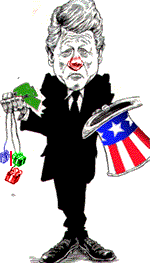|
|
Linda Chavez
Americans are unaware of NATO expansion
The U.S. SENATE has put on temporary hold one of the most momentous foreign-policy decisions since the end of the Cold War -- the expansion of NATO to include three former Soviet satellites: Poland, Hungary, and the Czech Republic.
Yet Americans seem largely unaware or indifferent to the issue, which the Senate
briefly considered last week. Chalk  up yet another casualty to the never-ending Clinton
scandals. What could allegations of presidential sexual misconduct and obstruction of
justice possibly have to do with the debate over NATO expansion? Unfortunately,
plenty.
up yet another casualty to the never-ending Clinton
scandals. What could allegations of presidential sexual misconduct and obstruction of
justice possibly have to do with the debate over NATO expansion? Unfortunately,
plenty.
Most Americans don't spend much time thinking about foreign policy, except during crises or war. It's usually up to the president to make Americans pay attention by speaking directly to them, as President Clinton did when he wanted to send troops to Haiti and Bosnia, or President Reagan did when he wanted Congress to provide aid to the Contras fighting the communist regime in Nicaragua. Traditionally, the president provides the direction and leadership in foreign policy, and Congress plays a supporting -- or sometimes, opposing -- role.
But President Clinton is in no position to rally the American people on anything right now. He's too busy fending off charges that he groped Kathleen Willey in the Oval Office and asked Monica Lewinsky to lie about whether she had sex with him. So when the Senate finally takes up NATO expansion, there will be little help from this White House in getting Americans to pay attention.
Since both the Clinton Administration and a large, bipartisan majority of the Senate favor NATO expansion, this lack of focus from the voters probably won't affect the outcome of the final vote -- but it's dangerous nonetheless. And I say this as someone who supports extending NATO membership to the new democracies of Central Europe.
For nearly 50 years, NATO has kept the peace in Europe and has been the linchpin of America's strategic defense. NATO commits each of its current 16 member-nations to defend an attack on any one member as an attack on all. If Poland, Hungary and the Czech Republic are admitted to NATO, American troops may one day be asked to risk their lives to defend these nations against an attack, just as we are now committed to defending England, France, Germany, and the other 12 NATO members.
This is no minor matter. It deserves the most careful consideration, not just by our elected leaders but by the people themselves. But almost no one seems to be paying attention. Some supporters seem willing to push through the Senate a quick vote on ratification of the NATO treaty amendment granting membership to the three former Warsaw Pact nations in the hopes that the issue won't sink in an isolationist quagmire.
But that instinct is wrong. Surely we learned from our experience in Vietnam that we cannot let our political leaders make decisions about sending troops to fight in foreign wars unless the American people are fully informed of the implications of those decisions and back them unequivocally.
Expanding NATO membership entails costs, both immediate and future. Estimates of the increase in our defense budget needed to accomplish the change range from a low of $1.5 billion from the administration to a high of $125 billion from the Congressional Budget Office. The differences in these estimates are hardly insignificant, and the American people deserve to know ahead of time how much the United States is committing to spend.
Even more importantly, Americans need to be apprized of the potential risks this undertaking entails. Imagine a scenario 10 or 20 years hence with a revitalized and hostile Russian and Belarusian army advancing toward neighboring Poland, while Yugoslavia attacked Hungary, in a kind of pincers movement to cut them and the Czech Republic off from their Western allies.
No doubt this scenario would be far less likely to unfold if Poland, Hungary and the Czech Republic were NATO members. But it is also true that should an attack occur, the United States would have to respond as if the attack were aimed directly at us.
The end of the Cold War dramatically reduced the risk of a major war for the United States, but it did not make the world entirely safe -- which is why we still need NATO in the first place. I believe that America is strong enough to extend our protective shield, through NATO, to the new democracies in Central Europe, but I suspect few Americans have even considered the question.
It's up to the president to make the case for NATO expansion to the American people.
If he can't fulfill this most basic obligation, he's cheating the nation of the leadership it
3/18/98: Intellectual-ghettoes in the name of diversity
3/11/98: Be careful what you wish for ...
3/4/98: The Press' Learning-disability
2/25/98: 50 States Are Enough!
2/18/98: Casey at the Mat
2/11/98: The legal profession's Final Solution
2/4/98: Faith and the movies
1/28/98: Clinton, Lewinsky, and Politics Vs. Principle
1/21/98: Movement on the Abortion Front
1/14/98: Clones, Courts, and Contradictions
1/7/98: Child custody or child endangerment?
12/31/97: Jerry Seinfeld, All-American
12/24/97: Affirmative alternatives: New initiatives for equal opportunity are out there
12/17/97: Opening a window of opportunity (a way out of bilingual education for California's Hispanic kids)